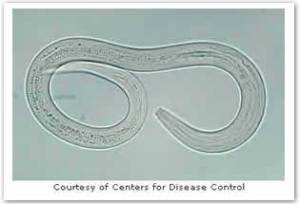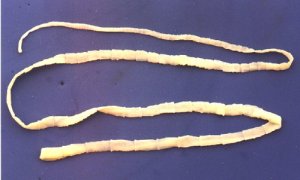Roundworms
Roundworms (Toxocara canis and Toxascaris leonina) are found in the intestine of dogs and are a great concern. Roundworms are transmitted from mother to puppy, via feces or soil where roundworms are present, or when dogs eat an infected rodent. When passed these worms look like wet spaghetti noodles. They cause diarrhoea, vomiting and bloody stools. Pups who demonstrate these symptoms in more than a mild manner should be taken to a vet immediately to rule out more serious issues.
Hookworm
Hookworm (Ancylostoma braziliense, Ancylostoma caninum, Ancylostoma tubaeforme, and Uncinaria stenocephala) can be transmitted through feces to mouth contact, from mother to puppy, or when a puppy’s skin comes into contact with infected fecal matter. These hookworms have big appetites and attach to the intestine and feed on the dog’s blood. This infection can be serious because it causes blood loss (anaemia), especially in puppies.
Tapeworms
Tapeworms (Taenia pisiformis, Dipylidium canium, Enchinococcus granulosus, and Echinococcus multilocularis) are found in the intestine of dogs and are transmissible to people. They are usually acquired by dogs by ingesting fleas or eating an animal that has a tapeworm infection. Signs and symptoms of a tapeworm infection are passing worm segments in the stool, lethargy, gastrointestinal upset and in severe cases intestinal blockage. Tapeworm eggs are rarely seen in facial examinations.
Whipworms
Whipworms (Trichuris vulpis) develop when a dog swallows whipworm eggs, passed from an infected dog. Symptoms may include diahorrea, anaemia and also dehydration. It is hard to detect as the numbers of eggs shed are low, and they are shed in waves. They get their common name from their shape as they look like a whip with a thicker posterior end.
Because people can also get infected with these worms by the ingestion of dirt contaminated with the faeces of infected dogs as well as the eggs of the worms themselves, intestinal worm elimination should be the concern on every responsible pet owner. By using a product that treats your dog for these 4 intestinal worms and practicing good hygiene, you will look after the health of both your pets and your family.




